Preventing Japanese Beetles
Hi everyone,
Last summer I saw that I was beginning to have some trouble with the JB's attacking my roses. I wanted to scream in frustration since I hate using chemicals in my yard, never have used insecticides and really hated the idea of having to start now.
I went in the house trying to think of what to use on them and decided I'd try some dish soap and water mixed together in a spray bottle. Low and behold it worked beautifully! The JB's hate getting their little mouths washed out with soap just as much as I did when I was a kid! The beetles that were on the leaves left fairly quickly after trying to find a non-soapy spot.
I proceeded to spray down all the leaves of the rose bush and kept checking back daily, no new chomps out of my leaves, the blooms were all safe. Rain washes the soap off so I reapplied after each rain fall and heavy dew. My only worry was that the soap might cause some burning of the leaves with sunlight but that never became an issue.
Just wanted to share my bit of luck with you.
Happy Gardening,
Tracy
Comments (80)
professorroush
11 years agoJapanese Beetles have converted many an organic gardener to manic sprayers. I don't have them here (yet) but they're coming. But I have hope that if you don't spray, eventually Nature will step in. I saw them invade my father's garden in Indiana...they were really bad for a few years and then it seemed like the populations stablized at only a nuisance level rather than a full-blown disaster....I'm assuming predators but I don't know for sure.
Here is a link that might be useful: Garden Musings blog
Dublinah
11 years agoJB's are straight from hell, they are a product from the devil, they are beneficial to no-one and nothing & they love my roses way too much!
I've tried a similar home-made spray; it was baby oil mixed with garlic powder. It did nothing other than make a mess and clog up the spray bottle, in other words, useless.
I refuse to use Sevin anymore. It's way to harsh and kills EVERYTHING, healthy or otherwise. (I have a dog and don't want to spray any chemicals of any kind.)
I use the death grip method, pick the bastards off each rose in the morning hours and drown them in a tupperware of warm water mixed with dishsoap. So a smaller version of the bucket of soup!
Hubby has been putting down milky spore for the second year now, fingers are crossed that it'll take effect in a few years.I hate them, just as much as I hate ticks!
deamon insect!Related Professionals
Allen Landscape Architects & Landscape Designers · Marina Landscape Architects & Landscape Designers · Mitchellville Landscape Architects & Landscape Designers · Walnut Landscape Architects & Landscape Designers · Costa Mesa Landscape Contractors · Framingham Landscape Contractors · Glendale Heights Landscape Contractors · Golden Gate Landscape Contractors · Longmont Landscape Contractors · North Lauderdale Landscape Contractors · Panama City Beach Landscape Contractors · Porterville Landscape Contractors · Wallingford Landscape Contractors · Kingsburg Landscape Contractors · Suisun City Landscape ContractorsGarrukBloomspeaker
11 years agoIt's been my experience that, once you are infested, it's almost impossible to get rid of them. An ounce of prevention is worth a pound of cure! I have had great luck using geraniums and marigolds to keep them away. The Geraniums appear to create a very sedative-like effect, which makes removal a breeze.
The best way to prevent an infestation is to make your garden inhospitable and appear to not be a food source. I find killing the "scout" beetles as they are called greatly cuts down on the presence of beetles. If they are unable to release the pheromone to attract their friends, few new beetles will make their homes. So far I've been able to keep all but 10-20 beetles at bay in my vegetable and flower gardens and those are very easy to kill!
sandandsun
11 years agoharryshoe,
I love your humble statement: "None the last two years and no known cause for the decline."
I've been killing them by hand or foot for years now. It's so easy. And each year there are fewer to kill.
I wonder if they have a chemical warning signal the way I've read that aphids supposedly do. If so, then there's the scent of Danger/Beware wafting through my garden.
If only all gardeners were magically exempt from squeamishness!floridarosez9 Morgan
11 years agoS@S, I didn't know they were in Florida. That's terrible news. I do get citrus beetles occasionally, but nothing like you guys are talking about. I wonder how long it will take them to get here in central Florida?
minflick
11 years agoHarry, what IS that bucket contraption? Extreme newbie out here in California, hoping like hell I never see those beetles! Holy moly. Do you pick them off your blooms and drop them down the pipe, and then the liquid kills them? Something else?
I live out here in the redwoods, and I see clover mites and some wee beautiful green caterpillar thing that does leaf damage but squishes nicely (that Glove of Death thing mentioned above, or naked thumb as they're small) on both roses and nasturtiums, and we have more than our (MY!) fair share of spiders around here.
gardenerzone4
11 years agoHarry, my roses look exactly like yours right now, and have for the past two weeks. After going out every single night in the record-breaking heat wave to pick 200-400 JBs (every single night) by hand for two weeks, I have given up being organic and applied a Bayer systemic (All In One) drench. The JBs have destroyed buds and blooms, and also turned foliage to lace and devoured my two linden trees. Now they're starting on my okra, and I can't apply anything toxic to that, so don't know what to do. I've applied milky spore many years in a row to no effect. Somebody get me some zen!
roseblush1
11 years agoMinflick...
You probably won't have to worry about JBs for a long time, but you will probably have to be on the look out for rose curculios. A couple of people who live in Santa Cruz have reported that they invade their gardens.
Lyn
minflick
11 years agoI've marked the calender for next year (April - June). I haven't seen them (Google is my friend!) but I'm pretty sure I did see holey petals, and I DID see some bud death, so I'm ready for next year. Hillside outside the fence is COVERED in black berries, and that's a host for them, but I can't do anything about the berries as the hill is vertical and I'm not going out there.
But, what was that contraption in the picture with the white bucket and big old fat pipe?
roseblush1
11 years agoHere's a link to a post on how I finally managed to reverse the infestation in my garden. We have plenty of blackberries, but Baldo told me that the curculios incubate in the wild species roses all around my home.
Good luck.
Smiles,
LynHere is a link that might be useful: Battling Rose Curculios
minflick
11 years agoLyn,
When do you chop the buds? Is it as soon as you see a beetle? And then you keep chopping for the next 2 months or so, until the 'season' is finished?Melinda
roseblush1
11 years agoHi Melinda.....
Yes, I dis-bud the whole garden as soon as I see the first curculio or curculio damaged bud. Seeing a curculio or damaged bud tells me the curculios are starting to migrate into my garden. I know they are not breeding in the garden any more because I had a clean first flush this year ... no damaged blooms.
Like Anne said about rose fragrance drawing JBs to the garden, I think the same thing is true for the curculios.
Since there are no buds to feed on or to lay their eggs in nor any roses in bloom, the curculios go elsewhere. I think JBs must be worse because they feed on more than just rose buds and on other plants, too.
I know curculios only have one generation per year and the 7 to 8 week period I've mentioned came from my gardening notes and not from any research on the net. I don't know if their period above ground varies with different climates.
Since I am removing undamaged buds, I know there are no larvae in them, so I don't have to take any extra measures of prevention when I disposed of them. (damaged buds, very few, go down the garbage disposal.)
The method of dis-budding is identical to deadheading, but you are removing buds instead of spent blooms.
Initially, I did try to control them by hand picking them and planted creeping thyme under the roses they were most attracted to in the hopes that the buds would not reach the soil. It slowed the infestation down, but not enough. I have about 100 roses and when I was handing picking one rose the dang bugs were working on the other 99.
I don't worry about host plants at all because I know the curculios will not come to the garden, if there are no buds available to them.
Trust me, it's easier to dis-bud the garden than to hand pick and squish bugs and takes a lot less time and energy.
I keep writing about this control method for curculios because when I did research on them, I did not see this control method mentioned.
Smiles,
LynHere is a link that might be useful: Baldo's Page on Rose Curculios
minflick
11 years agoI DO believe you that it's easier to dis-bud wholesale than to pick. It must be sad to do, but SO much easier than watching damage and knowing it's being carried to another generation because you're too timid to chop the buds...
One thing I saw for a few weeks on a hybrid tea is some black/dark bristly caterpillar that was about an inch long, had quite the set of light spiky bristles along its back and was chomping vast holes in my buds. It was flung into the driveway and stomped on, but I saw several, and had several buds damaged on my Oklahoma. Gone now, and I still have no idea what kind of caterpillar it is.
dan_keil_cr Keil
11 years agoJapanese Beetles, oh I used to have them. They have moved from our area into your areas!!! Insects run in cycles. We had them bad for 10 years and they have moved north and west and east and south!
henry_kuska
11 years agodan_keil_cr, rather than attributing the lack of numbers to the beetles moving, it is possible that Nature reestablished an equilibrium with "friendlies" in your area.
olga_6b
11 years agoI wonder why nature is so lazy here. I live in my current place 16.5 years and they still here in full force. :(
Olgahenry_kuska
11 years agoMaybe those who rely on chemical sprays have killed off the "friendlies" such as nematodes that attack the grub stage.
olga_6b
11 years agoHenry, I don't rely on chemical spays. I NEVER used incecticides in my yard. Period. My neighbours don't garden and don't care about JBs, so no grub treatments or sprays around. No Round Up here too, but plenty of RRD :)
Olgahenry_kuska
11 years agoolga_6b, the link below indicates that you have recently stated that you have stopped using chemical sprays. Your prior use of Banner Max (a Propiconazole based fungicide) could have had a negative effect on non target "friendlies".
How long have you had a chemical free yard? I would not be surprised if it may take 4 or 5 years for an equilibrium to establish. Have you tried to encourage the equilibrium by adding Milky Spore and beneficial nematodes?
http://forums2.gardenweb.com/forums/load/roses/msg0522434327894.html
olga_6b
11 years agoActually I used BM (fungucide, not insecticide) only on some roses. Majority of my roses are gallicas, mosses, albas, spinossissimas, etc. I never sprayed them. I get rid of once bloomers that are not healthy. For the last 3 years I don't spray even these few roses.
If this is not sufficient I can give you another example. My sister is 100% organic all her life. She neve sprayed anything except water on her plants. She has bigger yard than me and gorws roses as well as many other plants. I also grow a lot of different things. So diversity is present in both our yards. She lives in her house 16-17 years. JBs are full force in her yard all this time. When I have a lot, she has a lot. When it is lighter year for me, it is lighter year for her. We live approx 15 min by feet from each other.
Olgaserenasyh
11 years agoHehe, VBEG, surefire way to tame down JB population??? Kill the grass, don't water during drought season. JBs loooove well-watered lush greeen lawns. The greener the more lush, JBs have a paaartee. I allow my lawn/grass to die every year. Saves on mowing costs as well. Grass is TOUGH. They can still come up every Spring and Fall.
northerngnome
11 years agoHas anyone tried beneficial nematodes for JBs? Gardens Alive product link included.
Here is a link that might be useful: Beneficial nematodes
henry_kuska
11 years agoGardens Alive is my source for beneficial nematodes. I also use Milky Spore. I also have starlings.
Here is a link that might be useful: link that mentions starlings
sharonrossy
11 years agoHi, I'mnew to this forum. This year I couldn't believe what was on my roses. I was so disgusted that I sprayed with whatever I had, set up a trap and cut down my roses. So far so good. I have used the nematodes before for grub control. But it's been awhile and I guess I'll have to give an application. I seem to remember doing it in the fall as well. I didn't realize I could spray it in the garden as well. Actually, I didn't know JBs came from grubs! They are vile!
Sharonminflick
11 years agoHenry, are you saying the starlings eat the JP's? That would be very handy, indeed!
henry_kuska
11 years ago"Several natural predators eat Japanese beetles. Among birds, only starlings eat the beetles, but several others
eat the larvae in the spring. Several beneficial insects including Assassin bugs and Tiphia wasps attack
Japanese beetle larvae."Here is a link that might be useful: link for above
toolbelt68
9 years agoHas anyone tried using a shopvac to remove the JBs?? You could fill it part way with soapy water, then go from plant to plant sucking them off the flowers. They end up in the water and die. Just a thought..... lol
anntn6b
9 years agoA problem with assassin bugs: based on my watching assassin bugs eat Japanese Beetles in my garden, I never was able to time how long it took one AB to suck all the 'innards' out of one JB. I'd sit down where ABs had already caught their individual JBs and watch them suck the JBs. After forty minutes the ABs were still enjoying (I guess) the JB that they had been on when I first joined them. By that time I was bored and the border weeded and the Assassin bugs were still eating their first course.
meredith_e Z7b, Piedmont of NC, 1000' elevation
9 years agoThis year I noticed (this week) a bunch of black wasps with blue-black wings all over my roses and flying low above the yard. It turns out they are Blue-Winged Wasps, Scolia dubia, and they use JB grubs as the food source for their young! Woot!
I don't know why they picked this year to show up in great numbers, but it's totally fine by me :) Maybe they noticed the mole tunnels somehow, because those have gotten extensive in the open lawn. I hope they hit more JBs than June bug grubs. I have both and they eat both.
Here is a link that might be useful: Scolia dubia info and pics
cateyanne
9 years agoAbout the geranium post... There could be something to that. I have a terrible infestation of JBs this year after enjoying almost 4 years with almost none.(previous years bad, but not as bad as this one) Besides having too many things in my garden and yard they love, I have this year lots of geraniums in pots, hanging baskets and as bedding plants all around my house. Now I would say that with this evidence it could be the geraniums that are attracting them because they do feed on the blooms. But, every morning when I go out the side door there are dead or stunned JBs all over my porch, steps and driveway. They seem to be falling off the geraniums after feeding. they aren't leaving them totally alone, they still go for them so geraniums aren't a deterrent, but if the chemists could come up with a geranium concentrate that would knock them out and possibly kill them if strong enough, that would be wonderful. I hope they are working on this.
everjean
9 years agoMy garden is full of geraniums, and I still have JBs making lace and chomping holes everywhere; no evidence of the bite-and-die scenario described by others. Must admit I've only seen a few dozen JBs this year so far, but one is always on the cinquefoil, completely munching off the petals. Think I'll try that geranium tea with liquid Ivory soap, mint, and garlic, and see if the mailman will still venture past the garden to deliver the mail. Interestingly, I just read that applying worm castings (mixing with soil or putting a layer on top of soil) strengthens flowers' own defense system so they actually repel aphids and whiteflies. Think it would work for JBs?
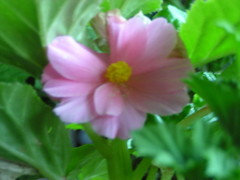
vasue VA
9 years agoUsually a few JP's show up & are easily picked off. Some years more than others, but never in large numbers. This year they came late to the party in mid-July & brought their friends - maybe a third the quantity shown in harryshoe's photo - an invasion. (Harryshoe, salute your devotion to your roses!) Finally all but gone a month later.
Doesn't help that roses here have good to powerful fragrance - a feature as attractive to them as to me. Even the nights & early mornings were too warm this Summer to make the beetles sluggish for easy capture. A friend keeps chickens, and she mentioned they love to chow down on JP's. Trying to figure out how to trap & keep them alive for feeding, got the idea to chill tall thick plastic glasses stacked in the freezer till the hunt was on.
Holding a frozen tumbler beneath a bloom, found merely bending the blossom into the mouth of the glass & tapping it gently against the interior caused all the beetles to immediately fall off, even those tucked into the petals, apparently stunned by the rising cold. Sometimes snipped the entire flower into the glass if it was nearly blown. Doing this bloom by bloom didn't alert those on other flowers & it was quick & neat to fill the glass halfway. Just needed a cardboard postcard capping to go into the fridge before grabbing another frozen glass & going at another rose bush. When all that day's harvest were trapped, poured them into wide-mouth mason jars with paper towel held in place across the top by the ring & into the fridge they neatly went. Stayed alive in cold storage & weren't awake enough to evade the chickens when shaken out on the ground for them, though they'd warmed on the ride over to my friend's house.
Never having jarred beetles this way before, must say it did my heart good to see them inert in their clear glass jars neatly lined up on the refrigerator shelf! Fresh from this organic garden, chickens gobbled them up. Took to calling them Japanese Relish...good for something - someone - after all.
Just thinking a plastic pitcher with a removable twist top that seals the spout would've been more efficient for the cluster-flowered roses. One of those on hand, must remember for next year - though hopefully this was one of those odd years (true in other ways) & won't be needed. Imagine the cold stun & capture approach could be modified & used for immediate disposal, or icy water used in the traditional bucket manner might be helpful.
"Hi, hen-girls. Look what a tasty treat I have for you here!"
This post was edited by vasue on Mon, Aug 25, 14 at 14:16
snkeii
9 years agoas posted by stlgal .. sorry couldnt figure out how to reply to that post
Imidacloprid/Merit - MERIT is the chemical name for application to trees or shrubs
merit or premise is the is the termiticide name is systemic and is applied at a 0.5% active ingredient ratio.
its what i like to use about a month before the rose beetle infestation hits (though i forget most of the time until i see them)
be sure to read the label carefully as this also has a longer residual in the soil. you wont want to use it if your plants are in or near some place you plan on using for edibles in the near future
for those of you worried about using chemicals its also in the some of the flea treatments you put on your dogs or cats neck at the same .5%dgrissom
9 years agoEveryone has their own way of dealing with Japanese Beetles. Here's something I've not read on this site. It works for me and prevents the little 'darlings' from reproducing!
When I notice the first JB, I will leave my pool light on over night. The JB's are attracted to the light and fly into the pool. While this first step doesn't kill them, once in the pool water they are trapped and cannot get out. They just float around. In the morning the pool pump starts and pulls all the floating JB's into the skimmer (JB's don't sink while they're alive). The suction of the pool skimmer pulls them down to the bottom of the skimmer basket and drowns the beetles. Then all I have to do is pull out the skimmer basket and empty it into a covered pail (in the off-chance one JB revives.)
I realize not everyone has a pool. However, a large pail with water with a couple drops of liquid dish soap placed under a light over night will result in a huge amount of JB's being trapped. How you then kill them is up to you!
Hope this helps... someone.
This post was edited by dgrissom on Tue, Sep 2, 14 at 13:11
ldcox
9 years agoFor the past two years, they have swarmed my compost for days and buried themselves all around and inside. Last winter, I moved my compost and found thousands of huge white grub like worms. Right now, after seeing one swarm again, I covered my compost with an old shower curtain. I know I can't leave it there during the heat of the day, I live in TX, due to killing all workers. If you've experienced this please share. Thanks
littlewriggly
9 years agoI Had a horrible time these past two summers with JBs almost killing my roses. I tried the blue dawn spray and eve an Ortho spray. My neighbor kills his with Seven Spray.....I hate pesticides but since they had almost devoured my three large bushes used it and no more so far. Don't know what else to use. Where do you buy milky spore?
gurliekangaroo
9 years agoIf you are using Bayer or Sevin dust you are not only killing Japanese Beetles, but also any bees that are attracted to your roses, and any or all beneficial insects. Poison is poison-too dangerous for any garden.
michaelg
9 years agoI set three pots of geraniums on a rail above three rose plants, and the JBs preferred the roses to the geraniums.
My suggestions:
1. Cut rosebuds as soon as they are openable and bring them to the house.
2. Give the roses a light pruning a soon as JBs are fairly thick, cutting back every young shoot.. Then you have no roses for six weeks and your yard is less attractive to JBs. When the next flush opens, the JBs will be waning or gone, unless conditions are extremely bad. Or, if water is short in your area, just don't irrigate in the summer and your roses will stop producing the flowers and tender foliage that JBs enjoy. You can get the roses cranked up again for the fall.
3. If your plants are not blooming (see #2), then it is OK to apply insecticide to the foliage. But please, do not apply Sevin or Merit to plants with open flowers, where it will kill bees..
4.Plant some once-blooming roses and enjoy them in May-June.
5. Gather beetles daily by shaking them into a pot half-full of soapy water. They instinctively drop off when disturbed.
6. Use milky spore and try to sell your neighbors on it. Follow instructions exactly.
7. This is controversial, but some people have reported good results by using multiple beetle traps placed at the margin of the property, especially in open flyways.
8. Sell your house by the golf course and move to a neighborhood where most people don't irrigate their lawns.
depeche
9 years agoFor those that are trying to remain organic, we have found that cayenne pepper works great as a repel on these buggers. We had a pretty sever problem with them eating our pole beans. We dusted the leaves and they have all but disappeared. See the link...
Here is a link that might be useful: Cayenne Pepper Pesticide
CraigJS
9 years agoPut the JB traps as far away as possible from your plants. Kill the stragglers with a spray bottle of h2o and Dawn. Works for my Basil plants. YMMV.
hummersteve
9 years agoI agree the JB traps only draw more of the pests. I usually end up going around with a bucket of soapy water under where the beetles are as they will usually just drop down anyway. But the last couple of years I have had a practically nil jb here , but the two years before I did put down milky spores as directed, seems to help. As a preventative the soapy spray or anything similar could help. For me they usually go after my cuphea plants more than anything else and thats where I always check for their lacework showing they are around. Planting garlic is also said to help.
Joe Moose, Zone 9A
9 years agoI had a small infestation of beetles a while back. While trying to see if I could find them, I saw two in the process of mating - I'm guessing they were the original culprits. I quickly took my sandal, flicked them off to the sidewalk, and squished them. So far, no new injuries! But I'm vigilant; I'll probably dust with cayenne pepper later on when it's less wet.
chrisdotson34 Dotson
9 years agoThe only method I have ever used and I have used many to rid of these Japanese Beetles is to use a bug zapper within 5 feet of the roses or whatever they end up feeding on. They are like thrips, once they start feeding on something and know where it is they tell all their buddies, and their offspring. They will continue to come back even if you eradicate them with soap or another Biological Pesticide. This I put out right at the first sign of damage, and after a few weeks I can take it inside. Then again after about a month or so if they come back which they do- I put out the zapper again.
Works for me in Hawaii.mmcphillip
8 years agoSevin is the only way to go for my very large Pussy Willow bush... Actually a tree now. And whoever said they don't like Geraniums is Wrong. Every morning I pick off at least 15-20 of them. They also like Japanese red maples. Did not see them on that tree until too late. All the leaves are lace. I was too pre-occupied with the Pussy Willow.
Next year the Japanese Maple gets thoroughly sprayed with Sevin along with the Pussy Willow.
cecily
8 years agoI can't imagine spraying a large tree with Sevin. I've never met you mmcphillip but I hope and pray that you wear a respirator and dress like an astronaut while doing this. God bless.
dublinbay z6 (KS)
8 years agolast modified: 8 years agoJapanese Maples are quite small "decorator" trees--at least all the ones I've ever seen are. I have some shrubs that grow larger than my neighbor's Japanese Maple.
cecily
8 years agoMy Bloodgood maple is about 15x10. Not something that an amateur should spray with a known carcinogen.
enchantedrosez5bma
8 years agoI fortunately have seen very few JBs this year, although other nasties have been munching on my rose buds. I think the culprits are grasshoppers and katydids. I recently planted roses and killed every grub that I dug up. It has been dry here. I don't know if this helps, although it's not good for my gardens or our well. I also don't have a lawn, just perennial/rose beds and gravel paths. I'm hoping that maybe the grubs aren't finding enough to eat since no expanse of lawn roots for them to feed on.
A question about Milky Spore. Can it be used in garden beds or is it only for use with lawns? I'm not sure how the nematode is spread.
Sharon
lainey2 VA
8 years agoJB's have been much more numerous this year than in the 30 years I have been gardening in Va. I don't know if they are getting smarter, or if it is an example of Natural Selection, but my JB's are hiding deep in the center of the blooms, making it harder for both the birds and me to get them.





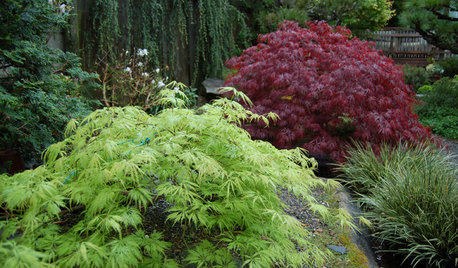


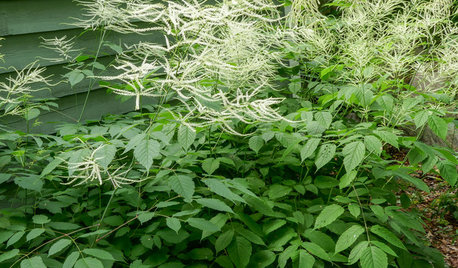
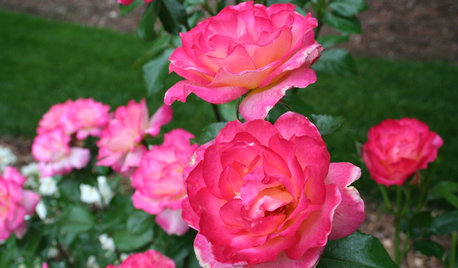






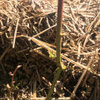

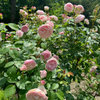

anntn6b